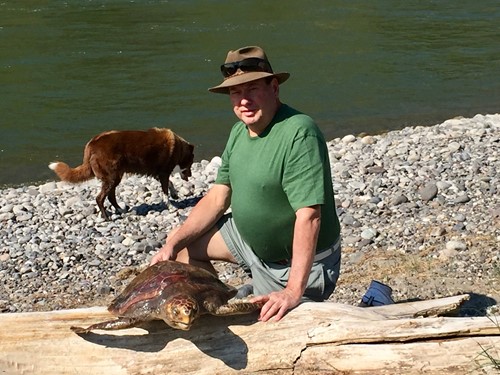Our environmental hero this quarter is the inspiring Leslie Weinstein, the founder of Turtles Fly Too. This organization helps rescue sea turtles - and occasionally other aquatic animals as well - by flying them to locations where they can be rehabilitated and released back into the wild.
Growing up in oceanside Florida, Leslie was fascinated by sea turtles' nesting habits. Leslie would watch, in fascination, as the turtles would crawl out of the water at night, lay eggs, and use their strong flippers to cover up to 200 small white balls with sand. Leslie knew that humans and animals often dug up the eggs, resulting in their destruction.
To prevent this, he began relocating the eggs to his family's beach, digging new nests, redepositing the eggs, and fencing them off with chicken wire. By doing this, successful hatchlings then returned to the beach the following seasons to lay their eggs. In 2010, Leslie and his wife made a decision to donate the beachfront acreage to the University of Florida to conduct research, conservation, and education. This beach is now critical for the University in learning all they can about the following seven turtle species – Loggerheads, Hawksbills, Greens, Olive Ridleys, Leatherbacks, Flatbacks, and the very endangered Kemp’s Ridleys.
In 2014, Leslie got the chance to incorporate another passion of his - aviation - into his turtle conservation efforts. He heard that an aquarium in New England had been overwhelmed by sea turtles that had been cold-stunned. This happens when the water temperature in the ocean drops suddenly, causing the turtles' body temperatures to decrease to dangerously low levels. Leslie connected with pilots he knew, and a small group of aviators flew to recover the turtles and transport them to Florida for rehabilitation.
This was the beginning of Turtles Fly Too, which has rescued thousands of turtles since its inception. According to Weinstein, the number of cold-stunned turtles averaged fewer than 100 per season years ago, but that “has skyrocketed.” Weather patterns have become less predictable. The water off the northern United States stays warmer longer and then surprises the animals with a sudden drop before they can migrate south safely. “We definitely, have a problem with climate change,” he says, and the number of turtles needing transportation increases yearly.
See this video produced by Brave Wilderness, dealing with the issues surrounding cold-stunned turtles. Keep an eye out for Green Kids' entire interview with Leslie Weinstein coming soon!
Full Unedited Interview
Sylvia M. Medina interviews Leslie Weinstein, founder of Turtles Fly Too. Information about how Turtles Fly Too got started, why Leslie does what he does, who he works with, and how you can help, are all talked about in the interview. Below are different sections of the interview divided into digestible sections that tell you what information to expect, those sections also have the technical difficulties cut out to make for a quicker more understandable watch.
Meet Leslie
This is the introduction to the interview that we did with Leslie he introduces himself and also goes into how turtles fly too got started.
What Turtles Does Turtles Fly Too Work With and Help?
Interview with Green Kids Club founder Sylvia M. Medina and Turtles Fly Too founder Leslie Weinstein. Leslie answers about what turtles his organization works with and helps to protect.
What Organizations Do You Work With?
Leslie Weinstein answers about the organizations and people that he works with.
Favorite times with one of the animals you have helped to save?
Leslie Weinstein answers and tells a story of his favorite animal-saving story.
Tell us about your operations and who helps run things?
Leslie explains that he is the only person that does operations and PR in the background.
Is Turtles Fly Too the only group doing this?
Leslie explains that his group is the only group that does what they do and he wishes they weren't the only group doing what they do.
How can people help with Turtles Fly Too?
Leslie explains how people are able to help Turtles Fly Too.
Ending notes and goodbyes
Leslie gives some last stories and sign-off messages and everyone says their goodbyes


About the author
Green Kids Club